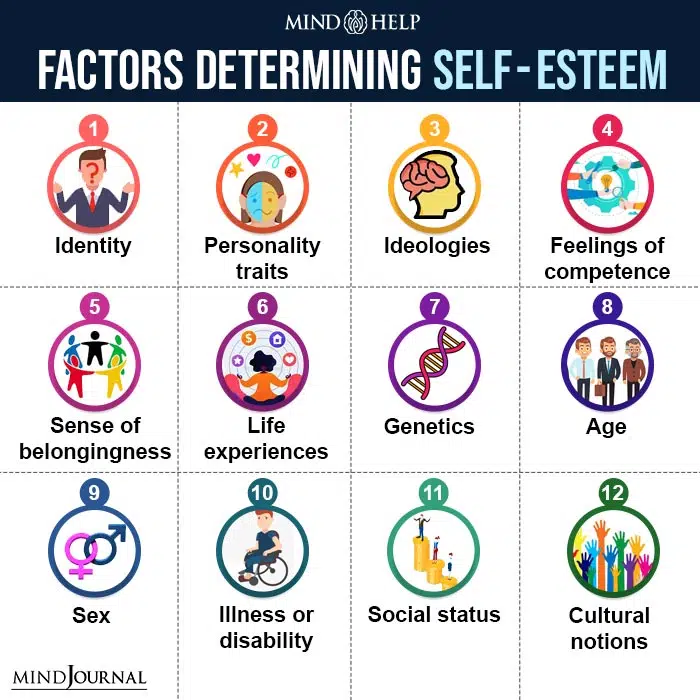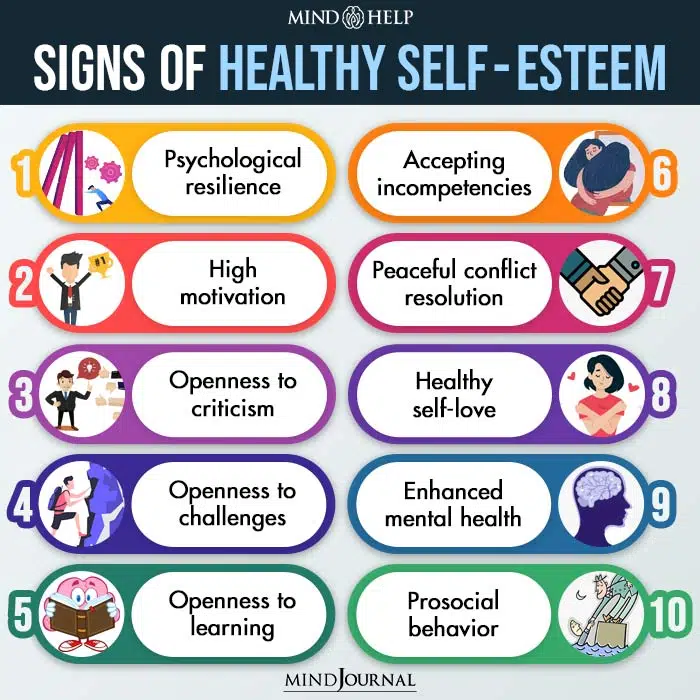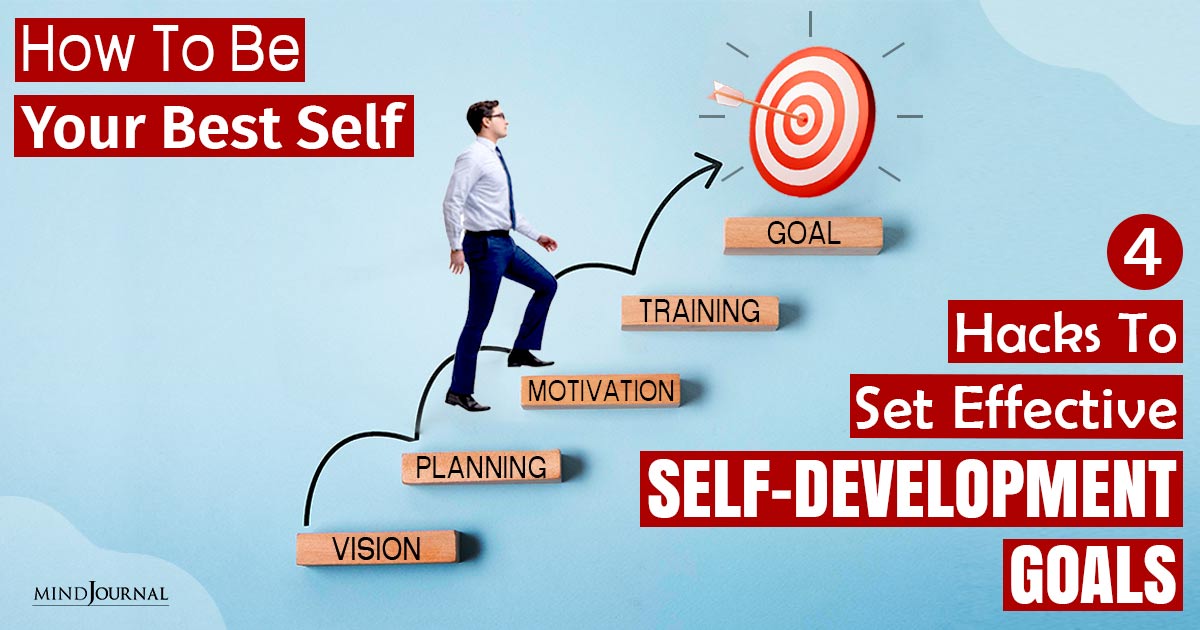Are you ready to unlock your inner confidence and embrace a life of high self-esteem? Let’s discover the psychology of self esteem and learn how to cultivate a strong sense of personal value to empower ourselves for success.
We all desire to feel confident, capable, and content in our lives, and understanding the psychology behind high self-esteem can help us achieve just that.
Defining Self-Esteem
At its core, self-esteem represents the way we perceive and evaluate ourselves. It encompasses our beliefs, thoughts, and feelings about our own worthiness and capabilities.
High self-esteem is characterized by a positive and realistic self-image, while low self-esteem often leads to self-doubt and negative self-perception. Understanding the psychology of self esteem enables us to recognize the factors that shape our self-worth and take control of our own narrative.
Related: 8 Types Of Self Esteem
Building Blocks of the Psychology of Self Esteem

Let us explore some of the factors that are closely associated with and strongly influence the psychology of high self esteem –
1. Early Childhood Influences
The seeds of self-esteem are planted during our formative years. The messages we receive from our caregivers, peers, and society significantly impact our self-perception.
Positive reinforcement, unconditional love, and encouragement foster a healthy sense of self-worth, while neglect, criticism, or abuse can erode it. Reflecting on our early experiences allows us to identify and challenge any negative beliefs that may be holding us back.
2. The Inner Critic
We all have an inner critic, that nagging voice that whispers self-deprecating thoughts and undermines our confidence. This internal dialogue often stems from past experiences, societal expectations, or unrealistic standards we set for ourselves.
Recognizing this critical voice and challenging its validity is essential for nurturing high self-esteem. By replacing self-defeating thoughts with self-compassion and positive affirmations, we can foster a kinder and more supportive inner dialogue.
3. Embracing Authenticity and Self-Acceptance
Authenticity is the cornerstone of the psychology of high self esteem. Embracing our true selves, flaws and all, allows us to cultivate a genuine sense of self-worth. It means acknowledging and celebrating our strengths while embracing our imperfections as part of our unique identity.
Accepting ourselves unconditionally and refusing to compare our journey to others’ empowers us to live authentically and enhances our self-esteem.
4. Setting Boundaries
Boundaries are essential for maintaining and protecting healthy self-esteem. By setting clear limits on what we will and will not tolerate, we safeguard our emotional well-being and protect our self-worth.
Learning to say no, expressing our needs, and surrounding ourselves with supportive individuals cultivates an environment that nurtures and uplifts our self-esteem.
5. Acknowledging Your Achievements
Recognizing and celebrating our accomplishments is crucial for building and reinforcing high self-esteem. By acknowledging our efforts and achievements, big or small, we validate our capabilities and strengths.
Cultivating a mindset of gratitude and taking pride in our progress fuels our self-esteem and encourages us to continue striving for personal growth.
Related: 20 Things That Low Self-Esteem Steals From You
6. Resilience in the Face of Challenges
Failure is an inevitable part of life, but how we respond to it significantly impacts our self-esteem. Instead of viewing setbacks as reflections of our self-worth, we can reframe them as opportunities for growth and learning.
Adopting a growth mindset, embracing resilience, and viewing challenges as stepping stones rather than stumbling blocks empowers us to bounce back and strengthens our self-esteem.
7. Cultivating Self-Care
According to the psychology of self esteem, Self-care is not only about pampering ourselves but also about recognizing and honoring our needs and emotions. Engaging in activities that promote physical, mental, and emotional well-being replenishes our self-esteem.
Prioritizing self-care allows us to refuel our energy, reduce stress, and strengthen our sense of self-worth.
8. Building a Supportive Network
Building and nurturing a supportive network is crucial for maintaining high self-esteem. Surrounding ourselves with individuals who uplift, inspire, and believe in us provides a foundation of support.
Seeking guidance from friends, family, or professionals can offer fresh perspectives and valuable insights, empowering us to overcome challenges and boost our self-esteem.

9. Self-Esteem and Relationships
Our self-esteem affects the quality of our relationships. When we have high self-esteem, we are more likely to form healthy connections based on mutual respect and support.
Conversely, low self-esteem can lead to codependency, seeking validation from others, or tolerating toxic relationships. Building a strong sense of self-worth allows us to establish and maintain fulfilling relationships that contribute positively to our overall well-being.
10. Self-Esteem and Success
Self-esteem and success often go hand in hand. When we believe in ourselves and our abilities, we are more likely to set ambitious goals, take risks, and persevere in the face of challenges.
High self-esteem fuels motivation, resilience, and a growth mindset, all of which are essential for achieving personal and professional success.
Related: The 4 Most Common Self-Esteem Issues That Can Break One’s Confidence
11. The Role of Self-Compassion
Self-compassion plays a vital role in nurturing high self-esteem. It involves treating ourselves with kindness, understanding, and forgiveness, especially when we make mistakes or face setbacks.
Self-compassion allows us to embrace our imperfections and failures with self-care and self-acceptance, fostering a sense of self-worth that is not contingent on external achievements or validation.
Remember, the journey towards high self-esteem is unique for each individual. It requires self-reflection, self-compassion, and a commitment to personal growth.
Takeaway
Understanding the psychology of self esteem is a powerful tool for personal growth and self-empowerment. By recognizing the factors that shape our self-perception and actively working towards building a healthy sense of self-worth, we can unlock our inner confidence and embrace a fulfilling life.
Remember, high self-esteem is not a destination but an ongoing journey of self-discovery and self-love. Embrace your uniqueness, celebrate your successes, and always remember that you are worthy of love, respect, and happiness.
May this exploration into the psychology of self esteem guide you towards a life filled with confidence, authenticity, and inner fulfillment.
Related: 8 Steps To Improving Your Self-Esteem
Frequently Asked Questions (FAQs):
What is the psychology behind self-esteem?
Self-esteem relates to one’s self-worth, influenced by experiences, perceptions, and social interactions, impacting mental and emotional well-being.
What are the 4 major factors that influence self-esteem?
Self-esteem is significantly influenced by social interactions, personal achievements, self-perception, and cultural/societal factors.
What are the three 3 types of self-esteem?
The three types of self-esteem are high self-esteem characterized by confidence, low self-esteem marked by self-doubt, and healthy balanced self-esteem.









Leave a Reply
You must be logged in to post a comment.